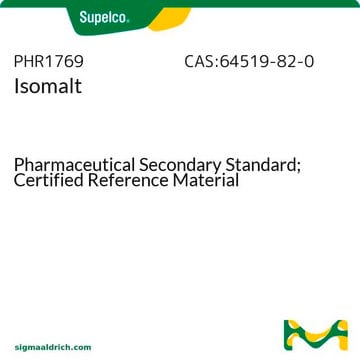85529
D-Sorbitol
BioUltra, ≥99.0% (HPLC)
Synonym(s):
D-Glucitol
About This Item
Recommended Products
vapor density
<1 (vs air)
vapor pressure
<0.1 mmHg ( 25 °C)
product line
BioUltra
Assay
≥99.0% (HPLC)
form
powder
optical activity
[α]20/D −1.5±0.3°, c = 10% in H2O
impurities
insoluble matter, passes filter test
ign. residue
≤0.1% (as SO4)
loss
≤0.5% loss on drying, 20 °C (HV)
color
colorless
pH
5.0-7.0 (25 °C, 1 M in H2O)
mp
98-100 °C (lit.)
solubility
H2O: 1 M at 20 °C, clear, colorless
anion traces
chloride (Cl-): ≤50 mg/kg
sulfate (SO42-): ≤50 mg/kg
cation traces
Al: ≤5 mg/kg
As: ≤0.1 mg/kg
Ba: ≤5 mg/kg
Bi: ≤5 mg/kg
Ca: ≤10 mg/kg
Cd: ≤5 mg/kg
Co: ≤5 mg/kg
Cr: ≤5 mg/kg
Cu: ≤5 mg/kg
Fe: ≤5 mg/kg
K: ≤50 mg/kg
Li: ≤5 mg/kg
Mg: ≤5 mg/kg
Mn: ≤5 mg/kg
Mo: ≤5 mg/kg
Na: ≤50 mg/kg
Ni: ≤5 mg/kg
Pb: ≤5 mg/kg
Sr: ≤5 mg/kg
Zn: ≤5 mg/kg
SMILES string
OC[C@@H](O)[C@@H](O)[C@H](O)[C@@H](O)CO
InChI
1S/C6H14O6/c7-1-3(9)5(11)6(12)4(10)2-8/h3-12H,1-2H2/t3-,4+,5-,6-/m1/s1
InChI key
FBPFZTCFMRRESA-JGWLITMVSA-N
Looking for similar products? Visit Product Comparison Guide
Application
Biochem/physiol Actions
Other Notes
Storage Class Code
11 - Combustible Solids
WGK
WGK 1
Flash Point(F)
Not applicable
Flash Point(C)
Not applicable
Personal Protective Equipment
Certificates of Analysis (COA)
Search for Certificates of Analysis (COA) by entering the products Lot/Batch Number. Lot and Batch Numbers can be found on a product’s label following the words ‘Lot’ or ‘Batch’.
Already Own This Product?
Find documentation for the products that you have recently purchased in the Document Library.
Customers Also Viewed
Our team of scientists has experience in all areas of research including Life Science, Material Science, Chemical Synthesis, Chromatography, Analytical and many others.
Contact Technical Service







